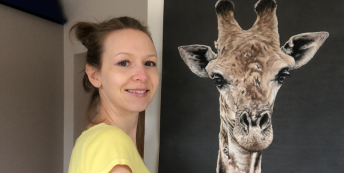“I’d drifted into a career and stayed because it was the easy thing to do.”

What work were you doing previously?
I worked in finance.
A mix of jobs including research, marketing, trading and broking.
What are you doing now?
I shifted into technology.
I’ve worked at a range of different size tech companies, a major arts organisation, and am now CTO (Chief Technology Officer) at a small startup called FLOWN.
We help remote workers do focused work. Our tools and products have been particularly helpful to those with ADHD.
Why did you change?
I wanted a change, a chance to try new things, an opportunity to work away from a big city.
Plus computers were starting to take our jobs, so I thought I’d better switch sides and start working with technology!
When was the moment you decided to make the change?
The initial push was losing a job and having no big plan to fall back on.
But also I’d realised I’d drifted into a career and then stayed because it was the easy thing to do.
I got another job back in banking, but the idea that I needed to have a bit more of a plan was sown.
So lots of spare time over the following five years was spent researching and preparing for a career change.
How did you choose your new career?
I looked at the skills I thought I could do, and was attracted to an interesting industry that had a range of opportunities (that were also well paid).
Are you happy with the change?
Yes!
Career change is hard work with no guarantee that it’ll work, but if it does it’s well worth the effort.
What do you miss and what don't you miss?
Many of the things I think I miss are really a reflection on ageing and time passing.
Seeing friends in that industry, I realise that most of the things I miss aren’t what I’d be doing if I'd stayed.
How did you go about making the shift?
I gave it lots of time, energy and thought.
I read lots of blog articles of people who’d changed careers.
I talked to friends and family, went to meetups, and used social media.
I spent four years learning to code in my spare time, then joined an intensive 16-week tech bootcamp with General Assembly.
I then took a junior role, starting at the bottom and learning through doing.
What didn’t go well? What wrong turns did you take?
There’s always ups and downs!
Transitioning from another career, you have many skills that are transferable and way more advanced than your younger peers (for example managing time, dealing with projects etc).
But then you also have other skills that are way below their levels (e.g. coding). Fortunately I had many companies that supported and made the best use of my old skills, and helped me learn new ones.
Mentally it can be tough starting from the bottom. Occasionally that frustration can creep in, so it’s about striking a careful balance of ambition and humility.
How did you handle your finances to make your shift possible?
In the five years of retraining, I planned, and saved money from a fortunately lucrative job.
I had about two years worth of savings in case it all went horribly wrong.
I also adjusted my spending patterns along the way.
What was the most difficult thing about changing?
Starting from the bottom and working your way up can be tough.
But it’s also a boost. It helps your mindset. I’ve started and tried so many other new things since the career change.
What help did you get?
I got help from family, friends, General Assembly, and online resources (both around career change broadly, and on tech).
What have you learnt in the process?
That there are so many exciting opportunities out there.
And with a little time and effort you can get a bit better at everything. Some things you’ll never master, but it’s fun to try.
What do you wish you'd done differently?
Everything and nothing!
I’m very happy with most of the past ten years. There are certainly plenty of parts where I could have done better. But plenty of times things went way above expectation.
Hopefully I’ve learnt from all of the experience, and things are always getting slightly better.
Having good feedback, support, mentors, and spending time to review how you are doing has helped make the most of any learnings.
What would you advise others to do in the same situation?
The process can feel easy when looking back.
A short few lines on a website about the change can gloss over the time and energy needed. Often you only hear from the success stories, and there is a risk it won’t work.
Make sure you put in the effort, or the chances of it working out are reduced.
Thank you to our friends at FLOWN for this story.
What lessons could you take from Mike's story to use in your own career change? Let us know in the comments below.



